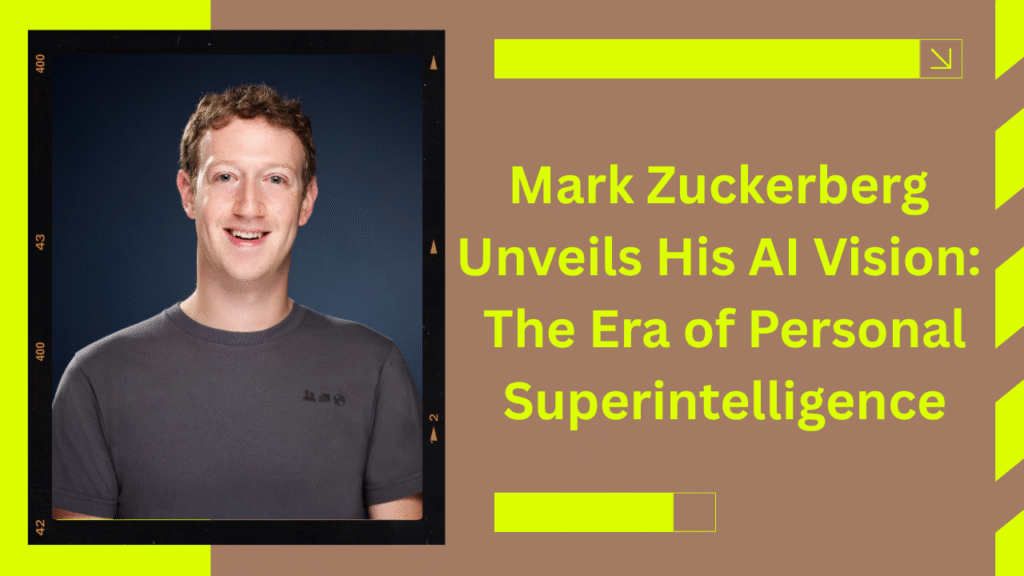In today’s AI-driven landscape, publishing a grand vision — or “manifesto” — has become a rite of passage for tech CEOs. Following in the footsteps of OpenAI’s Sam Altman and Anthropic’s Dario Amodei, Meta CEO Mark Zuckerberg has now entered the arena with his own bold statement titled “Personal Superintelligence.”
Just as Sam Altman shared his vision of a ‘gentle singularity’ and Dario Amodei outlined his outlook in ‘Machines of Loving Grace,’ Mark Zuckerberg’s new AI statement reflects a mix of futuristic optimism, ambitious goals, and carefully crafted messaging. He paints a future where artificial intelligence not only evolves rapidly but becomes an intimate part of everyday life, transforming the way we live, work, and interact.
🚀 Meta’s Billion-Dollar AI Bet
Zuckerberg has made it clear that Meta is all-in on AI. From heavy investments in infrastructure to integrating AI features across Facebook, Instagram, and WhatsApp, the company is pivoting hard toward artificial intelligence. Recent moves, including hiring top-tier talent from rival firms, underscore this commitment.
Now, through his manifesto, Zuckerberg publicly positions himself as a central figure in shaping the future of AI — not just from a technical or business standpoint, but as a cultural and societal influencer.
🌐 The Rise of “Personal Superintelligence”
Zuckerberg’s core proposition? A future where AI becomes deeply personalized, offering individuals tools to achieve their goals, expand creativity, enhance relationships, and unlock personal growth. He writes:
Zuckerberg suggests that we’re beginning to witness AI systems evolve autonomously — hinting that the development of superintelligent machines may no longer be far off.
Rather than focusing solely on automation or centralized AI control, as some industry leaders suggest, Zuckerberg champions decentralized, user-centric AI. His vision contrasts with ideas like universal basic income or large-scale automation displacing work — instead emphasizing empowerment through personal devices and AI companions.
Today Mark shared Meta’s vision for the future of personal superintelligence for everyone.
— AI at Meta (@AIatMeta) July 30, 2025
Read his full letter here: https://t.co/2p68g36KMj pic.twitter.com/Hpzf77jAiG
🧠 Mark Zuckerberg Familiar Themes, Fresh Packaging
Much of Zuckerberg’s letter echoes ideas already voiced by his peers. He uses historical context to show how far humanity has come — referencing the shift from agrarian society to today’s digital economy — and suggests AI will be another quantum leap forward.
His tone walks a tightrope between awe and authority, carefully avoiding strict definitions of “superintelligence” while nodding toward the idea that Meta’s version will be more human-aligned and accessible.
👓 Mark Zuckerberg Augmented Reality and the Next Computing Frontier
He foresees artificial intelligence being seamlessly integrated into daily life, particularly through advanced wearable technology like augmented reality glasses. These devices, he claims, will serve as personalized, intelligent assistants — seeing, hearing, and understanding their users’ environments in real-time.
“Personal devices that understand our context will become our primary computing tools,” he notes, aligning the AI narrative with Meta’s long-term AR strategy.
This allows him to reposition past metaverse ambitions — which have seen staggering losses — into a future-focused AI framework.
🤝 A New Kind of AI CEO?
Zuckerberg’s memo also functions as a branding move. With its minimalist design and introspective tone, it signals a shift: away from the combat-sport-loving, ultra-competitive CEO image, toward someone who is intellectually embedded in the AI world.
This approach seeks to attract top AI talent, reassure investors, and position Meta as a serious contender in the AI arms race — not just a follower of OpenAI, Google, or xAI.
⚖️ A Convincing Vision — Or Corporate Rebranding?
Despite the inspiring rhetoric, skepticism remains. The claim that Meta is offering a fundamentally different AI path is hard to swallow when most large tech firms are racing toward similar monetizable outcomes. Promises that AI will help users “be a better friend” or “grow into the person you aspire to be” feel especially hollow coming from a CEO known for his competitive, bottom-line-driven approach.
In a world where AI CEO manifestos often oscillate between utopian predictions and vague warnings, Zuckerberg’s version might seem less radical — but no less calculated. The real question isn’t whether Meta can build powerful AI, but whether its leadership can truly steer it toward empowering individuals over maximizing profit.






